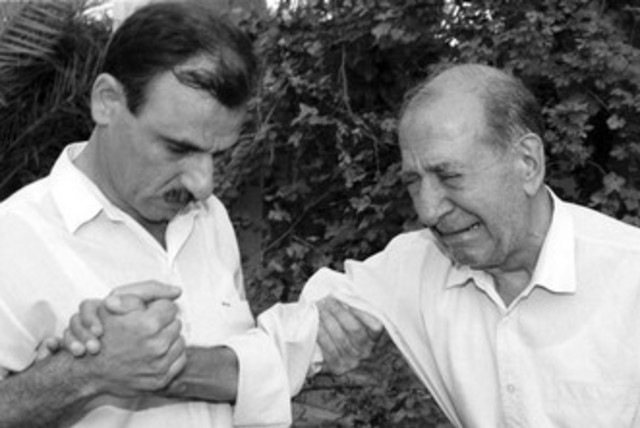Don't forget, remember the Farhud - editorial
More than 850,000 Jews fled or were expelled from Arab and Muslim lands in 1948, upon Israel’s establishment as a state.
We are living in an era when narratives battle with history – and often win.
This is particularly evident around this time of year, when the Palestinians and their supporters mark Nakba Day – commemorating the “catastrophe” of Israel’s creation – and Naksa Day, the “upset” of Israel surviving the Six Day War that was meant to wipe it off the face of the earth. Shamefully, Nakba Day was even commemorated this year in the United Nations, to mark its 75th anniversary.
There is, however, a gap in both knowledge and acknowledgment when it comes to the history of Jewish refugees from Arab lands. More than 850,000 Jews fled or were expelled from Arab and Muslim lands in 1948, upon Israel’s establishment as a state. But this did not come out of the blue.
Remember the Farhud
One of the horrific incidents that preceded this mass flight of Jews is often overlooked. It is the Farhud – the onslaught or violent dispossession – which took place in Iraq on June 1 and 2, 1941, coinciding with the Shavuot festival. It was a pogrom in every sense. 179 Jews of all ages were killed in the two-day rampage, which was concentrated in Baghdad and Basra. They were slaughtered in their homes and on the streets – wherever they were found by the murderous gangs, whipped up by Nazi propaganda and the pro-German Iraqi leadership.
The lethal attacks, rapes, killing, looting and desecration of synagogues affected the entire community. It is estimated that more than 2,000 Jews were wounded and the property of more than 50,000 Jews was looted or destroyed. The dead were later buried in mass graves – and the illusion of peaceful coexistence was buried with them. Although Jews had lived in this ancient Babylonia and Mesopotamia region for some 2,500 years, it counted for nothing when the Farhud broke out.
There were, of course, some righteous people among the general Muslim population, courageous people who risked their own lives to save their Jewish neighbors and friends. But they were a minority.
The campaign of terror came against the backdrop of the power vacuum between the collapse of the pro-Nazi government of Rashid Ali al-Gaylani, who had seized control from the Iraqi monarchy, and the return of British forces to Baghdad. The interim Iraqi prime minister was an ardent supporter of Hitler and introduced the Grand Mufti of Jerusalem, Haj Amin al-Husseini, to the Nazi leader. Nazi thinking fell on fertile ground. As always, the Jews paid the price.
And in many ways, Israel continues to pay the price. The lies spread by the grand mufti live on in conspiracy theories about Jewish designs on al-Aqsa – a fabrication that he concocted a century ago.
The wartime Iraqi government used radio and the Al-Alam Al-Arabi newspaper to spread antisemitic incitement. In the era of social media, the distortions and blood libels are able to spread even further – in an instant. The wave of terror attacks is partially fueled in this way.
The Palestinians use the battle cry “al-Aqsa is in danger!” to rally support across the Muslim world against Israel. The UN, with its anti-Israel obsession, is part of the problem. It is absurd to commemorate the Palestinians who left or were expelled during the 1948 War of Independence without so much as noting the similar numbers of Jews who lost their homes in Muslim lands.
In 1948 there were some 140,000 Jews in Algeria, 75,000 in Egypt, 150,000 in Iraq, 38,000 in Libya, 30,000 in Syria, 105,000 in Tunisia, 55,000 in Yemen and 100,000 in Iran. Today, some of those countries have no Jewish community at all; others have fewer than 10 Jews.
The late historian Robert Wistrich used to note how strange it is that Israel is accused of “ethnic cleansing” while the Jews have largely disappeared from Muslim lands and the Muslim population in Israel has grown since 1948.
The Knesset this week granted preliminary approval to a bill sponsored by MK Ofir Katz (Likud) calling for an annual Commemoration Day for the Farhud, to be held in June. The bill is important, but we don’t need to wait for it to pass into law. It is incumbent on us all to remember the Farhud and its lessons.
Jerusalem Post Store
`; document.getElementById("linkPremium").innerHTML = cont; var divWithLink = document.getElementById("premium-link"); if (divWithLink !== null && divWithLink !== 'undefined') { divWithLink.style.border = "solid 1px #cb0f3e"; divWithLink.style.textAlign = "center"; divWithLink.style.marginBottom = "15px"; divWithLink.style.marginTop = "15px"; divWithLink.style.width = "100%"; divWithLink.style.backgroundColor = "#122952"; divWithLink.style.color = "#ffffff"; divWithLink.style.lineHeight = "1.5"; } } (function (v, i) { });

